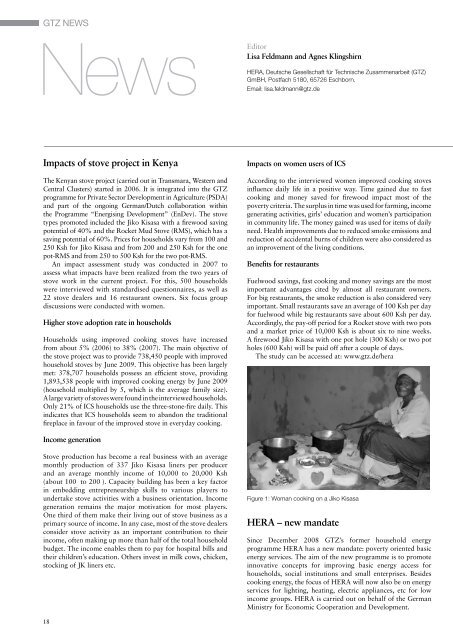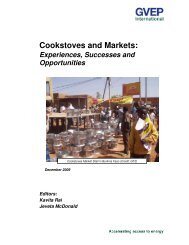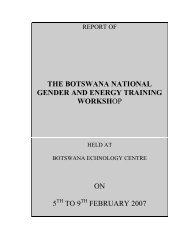Household Dynamics - HEDON Household Energy Network
Household Dynamics - HEDON Household Energy Network
Household Dynamics - HEDON Household Energy Network
Create successful ePaper yourself
Turn your PDF publications into a flip-book with our unique Google optimized e-Paper software.
GTZ NEWS<br />
News<br />
Impacts of stove project in Kenya<br />
The Kenyan stove project (carried out in Transmara, Western and<br />
Central Clusters) started in 2006. It is integrated into the GTZ<br />
programme for Private Sector Development in Agriculture (PSDA)<br />
and part of the ongoing German/Dutch collaboration within<br />
the Programme “Energising Development” (EnDev). The stove<br />
types promoted included the Jiko Kisasa with a firewood saving<br />
potential of 40% and the Rocket Mud Stove (RMS), which has a<br />
saving potential of 60%. Prices for households vary from 100 and<br />
250 Ksh for Jiko Kisasa and from 200 and 250 Ksh for the one<br />
pot-RMS and from 250 to 500 Ksh for the two pot-RMS.<br />
An impact assessment study was conducted in 2007 to<br />
assess what impacts have been realized from the two years of<br />
stove work in the current project. For this, 500 households<br />
were interviewed with standardised questionnaires, as well as<br />
22 stove dealers and 16 restaurant owners. Six focus group<br />
discussions were conducted with women.<br />
Higher stove adoption rate in households<br />
<strong>Household</strong>s using improved cooking stoves have increased<br />
from about 5% (2006) to 38% (2007). The main objective of<br />
the stove project was to provide 738,450 people with improved<br />
household stoves by June 2009. This objective has been largely<br />
met: 378,707 households possess an efficient stove, providing<br />
1,893,538 people with improved cooking energy by June 2009<br />
(household multiplied by 5, which is the average family size).<br />
A large variety of stoves were found in the interviewed households.<br />
Only 21% of ICS households use the three-stone-fire daily. This<br />
indicates that ICS households seem to abandon the traditional<br />
fireplace in favour of the improved stove in everyday cooking.<br />
Income generation<br />
Stove production has become a real business with an average<br />
monthly production of 337 Jiko Kisasa liners per producer<br />
and an average monthly income of 10,000 to 20,000 Ksh<br />
(about 100€ to 200€). Capacity building has been a key factor<br />
in embedding entrepreneurship skills to various players to<br />
undertake stove activities with a business orientation. Income<br />
generation remains the major motivation for most players.<br />
One third of them make their living out of stove business as a<br />
primary source of income. In any case, most of the stove dealers<br />
consider stove activity as an important contribution to their<br />
income, often making up more than half of the total household<br />
budget. The income enables them to pay for hospital bills and<br />
their children’s education. Others invest in milk cows, chicken,<br />
stocking of JK liners etc.<br />
18<br />
Editor<br />
Lisa Feldmann and Agnes Klingshirn<br />
HeRA, Deutsche Gesellschaft für Technische Zusammenarbeit (GTZ)<br />
GmBH, Postfach 5180, 65726 eschborn.<br />
email: lisa.feldmann@gtz.de<br />
Impacts on women users of ICS<br />
According to the interviewed women improved cooking stoves<br />
influence daily life in a positive way. Time gained due to fast<br />
cooking and money saved for firewood impact most of the<br />
poverty criteria. The surplus in time was used for farming, income<br />
generating activities, girls’ education and women’s participation<br />
in community life. The money gained was used for items of daily<br />
need. Health improvements due to reduced smoke emissions and<br />
reduction of accidental burns of children were also considered as<br />
an improvement of the living conditions.<br />
Benefits for restaurants<br />
Fuelwood savings, fast cooking and money savings are the most<br />
important advantages cited by almost all restaurant owners.<br />
For big restaurants, the smoke reduction is also considered very<br />
important. Small restaurants save an average of 100 Ksh per day<br />
for fuelwood while big restaurants save about 600 Ksh per day.<br />
Accordingly, the pay-off period for a Rocket stove with two pots<br />
and a market price of 10,000 Ksh is about six to nine weeks.<br />
A firewood Jiko Kisasa with one pot hole (300 Ksh) or two pot<br />
holes (600 Ksh) will be paid off after a couple of days.<br />
The study can be accessed at: www.gtz.de/hera<br />
Figure 1: Woman cooking on a Jiko Kisasa<br />
HERA – new mandate<br />
Since December 2008 GTZ’s former household energy<br />
programme HERA has a new mandate: poverty oriented basic<br />
energy services. The aim of the new programme is to promote<br />
innovative concepts for improving basic energy access for<br />
households, social institutions and small enterprises. Besides<br />
cooking energy, the focus of HERA will now also be on energy<br />
services for lighting, heating, electric appliances, etc for low<br />
income groups. HERA is carried out on behalf of the German<br />
Ministry for Economic Cooperation and Development.





